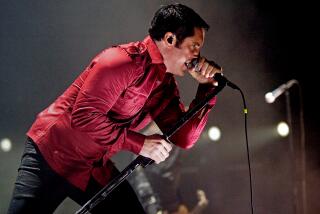Matchbox 20 Strikes an Anonymous ‘70s Chord
Let’s pretend for a moment that nothing interesting has happened in rock ‘n’ roll in, say, 20 years.
Let’s erase the youthful, punk-driven introspection of Kurt Cobain and the rest of the grunge movement that helped define a generation’s confusion and desire the way Bob Dylan and Lennon-McCartney did in earlier decades.
Let’s also throw out the work of Sinead O’Connor, Polly Jean Harvey and the others in a magnificent battery of liberating female voices who have brought a new agenda and perspective to a rock world previously dominated by men.
Also rule out such invaluable new influences as the cocksure swagger of rap, the visceral charge of techno and the moody soundscapes of trip-hop.
Sounds pretty dull, right?
Welcome to Matchbox 20, whose “Yourself or Someone Like You” album has sold more than 5 million copies and whose enthusiastic fans packed the Universal Amphitheatre on Friday night.
On record, the obvious reference points for Matchbox 20 are the Counting Crows and Hootie & the Blowfish, two other groups whose music sounds like it was written by someone who stopped listening to albums during the Carter administration.
Rob Thomas’ vocal timbre even sounds a lot like the Crows’ Adam Duritz, which means you hear traces of everyone from Van Morrison to, especially in Thomas’ case, Bob Seger.
Matchbox 20, like the Crows and Hootie, has sold millions of records by approximating the sound of an earlier era, which makes their music reassuring for listeners who moan about the loss of classic songwriting values in rock, but who don’t seem to demand the challenge and individuality that gave the best of that music its power.
The surprise on stage Friday was that Thomas had a far more intriguing identity than you’d suspect from the Matchbox 20 album--one that may make his future more worth monitoring than that of Duritz or Hootie’s Darius Rucker.
Unlike the ‘60s rock and soul strains of the Crows and Hootie, Thomas is much more a creature of the ‘70s--one whose influences are rooted in the pop of Elton John and Billy Joel.
One of Thomas’ problems is that his lyrics don’t take us beneath the surface. We know that he’s angry, that relationships never work out, that life is tough for him. We also sense that he, like Joel, sees himself as a survivor. But his lyrics lack both the character and revelation of the words that Bernie Taupin writes for John.
Thomas’ strength is that he is able to weave a remarkable number of commercial hooks around his
words. Even musically, however, he doesn’t break new ground. Thomas and his cohorts in the Florida band need to give the arrangements a personal stamp to do the melodies justice. As it is, the backing music is so anonymous that Thomas, who moves about with considerable intensity, seems almost like a man alone on stage.
Soul Asylum’s Dave Pirner is another songwriter who knows how to construct a hit, but he seems little more original than Thomas at this point in his career. Though he has shown the ability to reach into himself for songs that have an almost anthem-ish feel, he now seems simply struggling to find something worth saying.
Semisonic is a promising band that is affecting when it strikes the right balance between wry distance and heart, which it does in “Closing Time” and some other tracks from its “Feeling Strangely Fine” album. On Friday, however, the group couldn’t seem to find the balance, leaving its set a little cold.
More to Read
The biggest entertainment stories
Get our big stories about Hollywood, film, television, music, arts, culture and more right in your inbox as soon as they publish.
You may occasionally receive promotional content from the Los Angeles Times.










